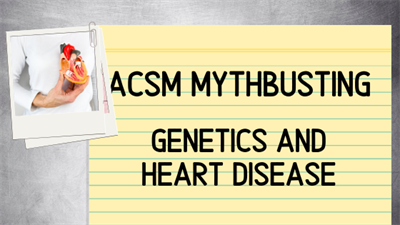Beth A. Taylor, Ph.D., FACSM |
Jan.
29, 2020
Myth: If I have a genetic predisposition to heart disease, there is nothing I can do to reduce my risk.
 It’s a very human condition to agonize over a broken heart: figuratively AND literally. Indeed, when it comes to heart disease, many of us operate in a black and white spectrum. First comes denial: IT (meaning heart disease) won’t happen to us. Then, comes despair: IT will, and there’s nothing we can do about it. And nothing stokes the attitude of despair more strongly than genetic doom; that is, the feeling of inevitability that comes from having a strong family history of heart disease. The truth about the heritability (or genetic component) of heart disease is far more positive, though: a glass far more full than empty, as long as we look at it accurately.
It’s a very human condition to agonize over a broken heart: figuratively AND literally. Indeed, when it comes to heart disease, many of us operate in a black and white spectrum. First comes denial: IT (meaning heart disease) won’t happen to us. Then, comes despair: IT will, and there’s nothing we can do about it. And nothing stokes the attitude of despair more strongly than genetic doom; that is, the feeling of inevitability that comes from having a strong family history of heart disease. The truth about the heritability (or genetic component) of heart disease is far more positive, though: a glass far more full than empty, as long as we look at it accurately.
It is true that genetic risk plays a formidable role in increasing heart disease risk. For example, individuals at high genetic risk for heart disease (defined in one study by classifying over 55,000 individuals as “high risk” vs. “low risk” for multiple genes) have a 91% higher chance of experiencing a cardiac event than low genetic risk individuals. As my colleague, Dr. Paul D. Thompson, renowned cardiologist and Director of the Athlete’s Heart Center at Hartford Hospital, typically advises: “The best way to prevent heart disease is to pick the right parents.” Easier said than done! However, the glass-half-full interpretation of the study referenced above is to read further that the high genetic risk individuals who participated in at least three of four healthy lifestyle factors (no current smoking, no obesity, regular physical activity and a healthy diet) reduced their risk of coronary events by 46%, in essence halving their inherent genetic risk. Why? The way we live our lives influences whether our risky genes express themselves or not. This concept, termed epigenetics, refers to the environmental modification of genetic risk. Yes, we may have genes that predispose us to cardiovascular disease, but when, how and to what extent those genes express themselves is highly influenced by lifestyle. For example, gaining just six pounds evokes dramatic changes in gene expression that are not fully reversed by weight loss. Similarly, people with metabolic syndrome exhibit an epigenetic profile that is much older than those without metabolic syndrome.
The glass looks even better when we consider being healthy across the lifespan rather than at a single age. When three generations of the Framingham Heart Study were studied, investigators concluded that the heritability of ideal cardiovascular health was only 13-18%, with health behaviors and lifestyle factors being much more influential. So, what really matters each day? A recent study found that adhering to just four out of five of these healthy lifestyle factors (avoiding smoking, obesity and excessive alcohol intake, while performing 30 or more minutes a day of moderate to vigorous physical activity and eating a healthy, high-quality diet) increased the likelihood of living free of cardiovascular disease, cancer and Type 2 diabetes by over 10 years in women and seven years in men.
The take-home message is the following: You can’t completely cure a broken heart. But you can make it a lot worse, by doing things like sitting, smoking and drinking. Or you can make it a lot better, by eating well and exercising. The choice is yours, and that glass is pretty full!
 Beth A. Taylor, Ph.D., FACSM, is an Associate Professor of Kinesiology at University of Connecticut as well as the Director of Exercise Physiology Research at Hartford Hospital. Her research interests focus on interactions between exercise, aging, cardiovascular disease and commonly used cardiovascular medications. An avid runner herself, Dr. Taylor has also conducted studies at the Boston and Hartford Marathons to determine the effects of sustained endurance exercise on blood clot risk, markers of cardiovascular injury and stress, and the effects of cholesterol-lowering drugs on these biomarkers.
Beth A. Taylor, Ph.D., FACSM, is an Associate Professor of Kinesiology at University of Connecticut as well as the Director of Exercise Physiology Research at Hartford Hospital. Her research interests focus on interactions between exercise, aging, cardiovascular disease and commonly used cardiovascular medications. An avid runner herself, Dr. Taylor has also conducted studies at the Boston and Hartford Marathons to determine the effects of sustained endurance exercise on blood clot risk, markers of cardiovascular injury and stress, and the effects of cholesterol-lowering drugs on these biomarkers.